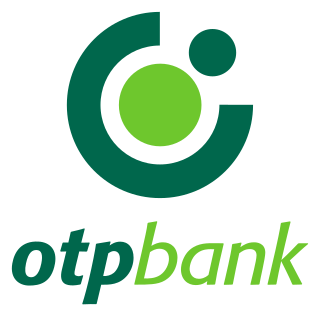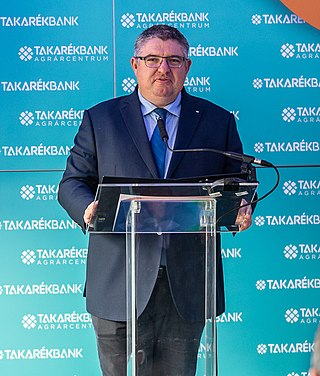
Magyar Telekom Nyrt. is one of the leading Hungarian telecommunications service provider company. It is a subsidiary of Deutsche Telekom.

Wizz Air Holdings plc is a Hungarian ultra low-cost carrier group registered in Jersey. The company includes the subsidiaries Wizz Air Hungary, Wizz Air Malta, Wizz Air Abu Dhabi and Wizz Air UK. The airlines serve numerous cities across Europe, as well as some destinations in North Africa, the Middle East, South, and Central Asia. As of 2023, the airline group has its largest bases at Budapest Ferenc Liszt International Airport, Bucharest Henri Coandă International Airport and London Luton Airport and flies to 194 airports. The holding company is listed on the London Stock Exchange and is a constituent of the FTSE 250 Index.

OTP Bank Group is the largest commercial bank of Hungary and one of the largest independent financial service providers in Central and Eastern Europe, with banking services for private individuals and corporate clients. The OTP Group comprises subsidiaries in the field of insurance, real estate, factoring, leasing and asset management, investment and pension funds. Besides Hungary, OTP Group operates in 11 countries of the region via its subsidiaries: in Albania, in Bulgaria, in Croatia, in Romania, in Serbia, in Slovenia, in Ukraine, in Moldova, in Montenegro, in Russia, and in Uzbekistan.

Gedeon Richter Plc. is a European multinational pharmaceutical and biotechnology company headquartered in Budapest. It is the largest pharmaceutical company in Central and Eastern Europe, with an expanding direct presence in Western Europe, China, Northern America and Latin America. Richter has the largest R&D unit in Central and Eastern Europe and operations in over 100 countries.

Budapest Stock Exchange(BSE) (Hungarian: Budapesti Értéktőzsde (BÉT)) is the 2nd largest stock exchange in Central and Eastern Europe by market capitalization and liquidity. It is located at 55 Krisztina Boulevard, Budapest, Hungary, in the Buda Centre of the Hungarian National Bank Previously, from 1864, during the Austro-Hungarian Empire it was located in the Budapest Stock Exchange Palace building, until a large trading floor was necessary. The exchange is controlled by listed issuers, by Hungarian private investors and by the central bank. The BSE is member of the World Federation of Exchanges and the Federation of European Securities Exchanges.

MOL Plc., also known as MOL Group, is a Hungarian multinational oil and gas company headquartered in Budapest, Hungary. Members of MOL Group include among others the Croatian and Slovak formerly state-owned oil and gas companies, INA and Slovnaft. MOL is Hungary's most profitable enterprise, with net profits of $770 million in 2019. The company is also the third most valuable company in Central and Eastern Europe and placed 402 on the Fortune Global 500 list of the world's largest companies in 2013.

MKB Bank, initially Magyar Külkereskedelmi Bank, was a Hungarian state-owned bank founded in 1950. It was privatized in the mid-1990s, then renationalized in the 2010s. It eventually merged in the early 2020s with Budapest Bank and Takarékbank to form Magyar Bank Holding, branded MBH Bank, thus creating the second-largest commercial bank in Hungary behind OTP Bank. The complex three-way merger was announced in 2020 and completed in 2023.

CIB Bank is the second-biggest commercial bank in Hungary, after the 1 January 2008 merger with Inter-Európa Bank. This follows the 2007 merger of their respective Italian parent companies, Banca Intesa and Sanpaolo IMI to form Intesa Sanpaolo.

K&H Bank is one of the biggest commercial banks in Hungary, owned by the Brussels-based KBC Group since 1999.

Hungary has a tax-funded universal healthcare system, organized by the state-owned National Health Insurance Fund. While healthcare is considered universal, several reasons persist preventing Hungarian nationals to access healthcare services. For instance, a Hungarian citizen who lived abroad but is unable to show contributions to another country's healthcare system will not be able to access the Hungarian healthcare system free of charge. However, to the OECD, 100% of the total population is covered by universal health insurance, which is absolutely free for children, mothers or fathers with babies, students, pensioners, people with low income, handicapped people, priests and other church employees. In 2022 the cost of public health insurance is 8,400 HUF per month which is the equivalent of $23.69. The healthcare system underwent significant changes which also resulted in improving life expectancy and a very low infant mortality rate. According to the OECD Hungary spent 7.8% of its GDP on health care in 2012. Total health expenditure was $US1,688.7 per capita in 2011, US$1,098.3governmental-fund (65%) and US$590.4 private-fund (35%).
Zsigmond Járai is a Hungarian politician, who served as Minister of Finance between 1998 and 2000. He was the President of the Budapest Stock Exchange between 1996 and 1998. After his ministership he was appointed President of the Hungarian National Bank. Járai was succeeded by András Simor in 2007.

Christopher Mattheisen is an American businessman and economist. He was the managing director of Microsoft Hungary from March 4, 2019. From 2006 to 2018, he was the CEO of Hungarian telecommunications company Magyar Telekom.
Hungarian Development Bank Private Limited Company or Hungarian Development Bank, in short, is a credit institution fully owned by the government of Hungary.
TakarékBank was a banking and financial services corporation in Hungary and the central institution for more than 60 co-operative banks and their 1,100 branch offices. In 2023, it merged with MKB Bank to form MBH Bank.

Zsolt Hernádi is a Hungarian businessman and the Chairman-CEO of MOL Plc., the Hungarian Oil & Gas company, since 2001.

Éva Hegedüs is an economist, the founding Chairman-CEO and shareholder through E.P.M. Ltd. of Gránit Bank.

Lőrinc Mészáros is a Hungarian businessman, and former politician, who served as Mayor of the Hungarian village Felcsút between 2011 and 2018. With an estimated wealth of 436 billion forint ($1.3 billion) as of 2022, he is, according to Forbes, the third richest person in Hungary. Several media outlets refer to him as "oligarch".
Opus Global is a Hungarian industrial conglomerate and asset management company, headquartered in Budapest, Hungary. Opus Global's subsidiaries play a significant role in Hungary's strategically important industries.

Erik Keszthelyi is a Hungarian economist and owner of Hungarikum Biztosítási Alkusz, the largest Hungarian-owned insurance broker, which also owns a majority stake in CIG Pannonia. He is also the 47th richest person in Hungary as of 2023.

József Vida is a Hungarian economist, chairman of the board of Opus Global, former CEO of Takarékbank, and, as of 2023, with 15 billion HUF the 98th richest Hungarian.















